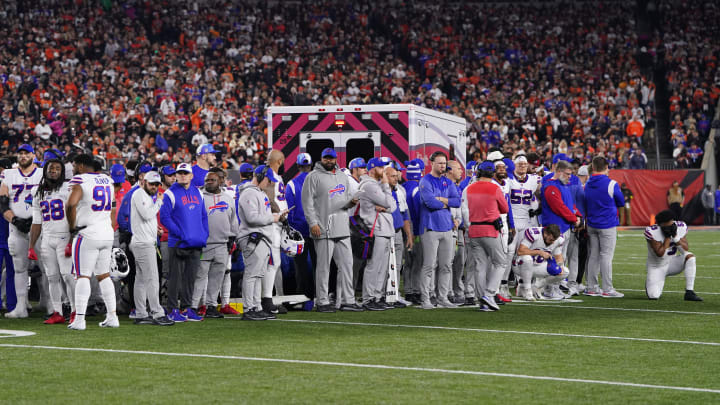Damar Hamlin Nearly Died While We All Watched Live

Late Monday afternoon, I was texting a fellow USC fan after the team's collapse in the Cotton Bowl. As the conversation wound down, I sent the following message: "This is supposed to be fun. It's football, not life or death." A few hours later I was proven terribly wrong.
By now you're all aware of what happened to Damar Hamlin Monday night. How he collapsed after making what appeared to be a routine tackle. How he was motionless on the field at Paycor Stadium as millions watched in stunned silence. The minutes of confusion, shock and horror that followed as medical professionals administered CPR and used a defibrillator in an attempt to revive the 25-year-old. A few seconds would have meant the difference between life or death.
Hamlin's heart stopped on the field Monday night as he suffered a cardiac arrest. His body lay on the turf as his Buffalo Bills teammates and their Cincinnati Bengals opponents looked on in horror a few feet away. Suddenly there were no teams, no fans, no commentators and no neutral observers. In those moments we were all human beings hoping and praying that another one of us wasn't gone. There was a feeling of unity, a rare occasion where everyone on the planet wished for the same outcome.
Aside from a few notable exceptions, there was no talk of rescheduling the game, playoff scenarios, fantasy football championship outcomes or gambling implications. Virtually no one argued with the decision to suspend the contest. Entering Monday night we were told how monumentally important the matchup between the Bills and Bengals was. Perspective on that shifted pretty damn quickly. Suddenly, it was just a game, and no one cared much about the outcome.
ESPN's work on the broadcast and the aftermath of the incident was excellent. The network handled the horrific situation as well as it could have. Joe Buck and Troy Aikman were speechless, just like the rest of us. Suzy Kolber handled her role with a quiet grace. Booger McFarland was visibly shaken but opened up about what he was feeling. Scott Van Pelt put the night in perspective, while Ryan Clark added raw emotion. Every element of the coverage was focused on one thing: the well-being of Damar Hamlin. There were no other thoughts.
In what was the most poignant quote of the night, McFarland implored the NFL to suspend the game saying, "Football is played as entertainment. I don't think anybody is in the mood, nor the spirit to be entertained tonight. The only thing we're concerned about is that young man, his family, what's going on with him, making sure he's OK. That's it. We'll figure out the football game at some other point in time ... we're done playing football tonight."
Football is entertainment. It's supposed to be fun. It shouldn't be life or death.
On Sundays, when we're all cheering for our favorite teams, It's easy to think of football players as numbers or nameplates on jerseys. Monday night was a stark reminder that beneath those helmets and under those pads are actual people, each with their own unique life story, goals, desires, hobbies and family. And that in a split second, it can all be ripped away.
When NFL players get injured we nearly always think of the consequences in football terms. Will he make it back this season? Will he be ready for training camp? How much money is left on his contract? Rarely do we ask if those men, who play a supremely violent sport, will ever be the same. The real, human cost of the game is the last thing most consider. Maybe we should.
I know as a society we've become numb to horror and tragedy, but what happened to Hamlin on Monday night was real. This wasn't a movie or a video game. He almost died on a football field in southwestern Ohio while millions watched it live.
Damar Hamlin is a person, not a player. He's a human, not a jersey number. He's a son, not a safety. On Monday night, we almost lost him.